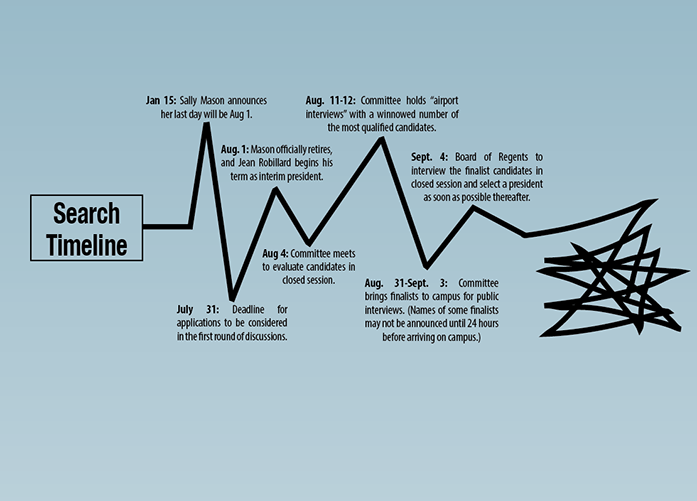The University of Iowa’s next president will be announced Thursday, while many faculty remain weary and frustrated with the process.
By Tom Ackerman
[email protected]
The state Board of Regents is expected to select the University of Iowa’s new president at the end of the week after a search that began in February.
However, some UI faculty members fear the search timeline and process have left little time for consideration or public scrutiny of the candidates. The regents are expected to make a decision Thursday, two days after the last finalist visits campus.
“There’s no time for the Board of Regents to do any sort of systematic investigation of these candidates,” said Bob McMurray, a UI professor of psychology.
Regent Senior Communications Director Josh Lehman said this search was similar to the last searches in both procedure and time, referring to the hiring of Bill Ruud at the University of Northern Iowa in 2013 and Steven Leath at Iowa State University in 2011.
“The Search [Committee] was disbanded before this critical phase. They’re the ones who could’ve said, ‘Whoa, we’re going too fast’ and helped get people get in the process,” McMurray said. “That’s not typical.”
Regent Larry McKibben said he has no issues with the process.
“UI has handled the communications process very well,” McKibben said. “I’m going to be choosing from four outstanding candidates.”
The regents also offered a feedback form for the public to offer criticism given through Parker Executive Search, which partnered with the Search Committee.
Faculty members said they believe the surveys to be dismissive and ineffective. The UI chapter of the American Association of University Professors has offered its own online feedback form as an alternative.
In addition, the room on the survey left for comments was thought to be small and unorganized by faculty.
“It’s unquantifiable, it’s undigestible, and it takes a lot of time to do that [read through the material],” said Psychology Professor Ed Wasserman.
Lehman said the survey would be beneficial for the search process.
“They do this often for other searches,” he said. “It gives people a chance to use technology … to give open and unfiltered feedback.”
The professors’ association survey takes a more numbers-based approach, which will be given to the Faculty Senate. The Senate will recommend a candidate to the regents.
“We’ve been collecting numeric data from people in which you can actually rate,” McMurray said. “Our thought is we can give this to the regents, and they can see pretty quickly how folks feel. They can at least disregard it, that’s fine, but at least it’s objective in a way.”
Faculty members hope to see students get involved and for the community to take advantage of the survey to express their thoughts.
“At the end of the day, we all have to support whoever it is and get on board for whatever their vision for the university is, and people are going to do that if they feel like their voices have been heard,” McMurray said.



